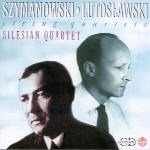Issued on a Polish label and performed by a Polish quartet, this disc is a giddy celebration of the music of two of Poland’s greatest sons. But the attractions of this recording extend far beyond flag-waving: although for the most part they have been overlooked, the three quartets offered here are milestone works in the 20th-century quartet literature. The impressionistic textures of Karol Szymanowski’s first quartet, written in 1917, undoubtedly will remind many listeners of Debussy’s lone work in the genre. The second movement blossoms into lushness, the inner voices murmuring as the first violin serenely skims its highest register. The concluding third movement is a much more bracing affair that’s heavy on rhythmic play and pizzicato. Szymanowski’s second quartet was written in 1927 for a composition competition held in Philadelphia. It lost to Bartók’s Third Quartet and Alfredo Casella’s Serenade, but no matter; the piece is still a delight. Although Szymanowski drew upon various Polish folk music sources for its inspiration, the quartet never stoops to drippy, nationalistic sentimentalism. Instead, it’s tonally bracing and rhythmically vigorous, especially the inner Vivace/Scherzando movement.
Witold Lutoslawski’s 1965 quartet, written for the La Salle Quartet, shares some similarities with the preceding works, most notably in terms of a common emphasis on rhythm. Theoretically, though, the later composition bears more similarity to John Cage than to anything–or anyone–else. The composer, who resisted making a full score of the piece, termed the work “a sequence of mobiles” in which the players are required to make many compositional decisions about such matters as the duration of notes and rests. The result is fascinating, particularly in the extended pizzicato section of the Introductory Movement, where the notes fall as so many raindrops, uniform in their makeup and size yet individually distinct. The Main Movement underscores the idea of the string quartet as a conversation among four personalities. The composer demands that the players be in a constant state of active, vital engagement with each other–merely burrowing down into the written notation is an impossibility. Lutoslawski’s rigors make for compelling music-making, and compelling listening. The Silesian Quartet, formed in 1978 and a frequent concertizer in Europe, is a group of fearless and exquisitely accomplished players, fluent interpreters of their countrymen’s music. The sound is acceptable if a little mushy and indistinct, and there’s no guarantee that this disc will be easy to find internationally. Even so, it’s abundantly worth seeking out.
































